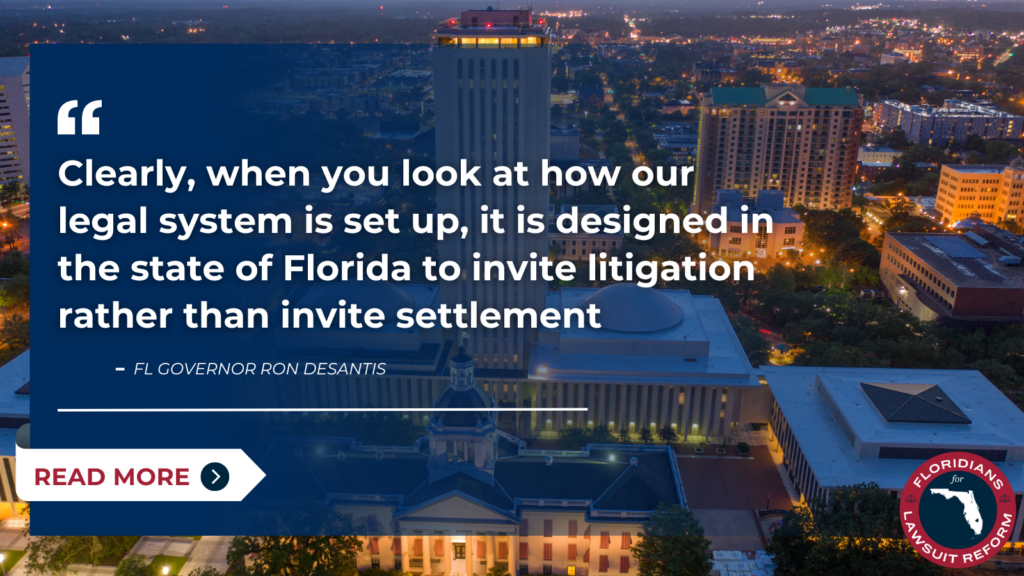
A sponsor of a far-reaching Florida tort-reform bill warned last week that the measure, unlike previously adopted insurance legislation, is subject to change as it moves through the House and the Senate.
On Tuesday, that proved true as the Senate Judiciary Committee endorsed a new version of Senate Bill 236, a version that insurance interests said could chip away at a recent ban on one-way attorney fees.
“It’s evident that this bill has gotten better,” said state Sen. Travis Hutson, R-Palm Coast, as he concluded the committee’s hearing on the bill Tuesday evening. “A lot of work has been done and we’re still trying to figure out the best way forward on some things.”
SB 236 is the Senate version of House Bill 837, a sweeping measure that would extend the ban on one-way attorney fees, enacted for property insurance claims disputes by SB 2A in December, to auto and liability insurance. One-way fees, often granted to plaintiffs when they prevail in court, have been called the linchpin of the insurance crisis in Florida and a big incentive for unnecessary claims litigation.
Hutson’s amendment would allow one-way fees in one circumstance: when an insured asks a court for a declaratory judgment after a claim has been wrongfully denied.
“The court shall award reasonable attorney fees to the named insured, omnibus insured, or named beneficiary under a policy issued by the insurer, upon rendition of a declaratory judgment in favor of the named insured, omnibus insured, or named beneficiary,” the amendment reads.
The thinking, according to those familiar with the sausage-making on the bill, is that in some cases, such as those involving life insurance, a declaratory judgment may be needed for beneficiaries to obtain benefits when insurers have wrongly denied claims. Without awarded fees, plaintiffs’ lawyers may have little interest in making the effort.
But some insurance industry advocates are now warning that the language could allow plaintiffs’ attorneys to seek declaratory judgments in other types of insurance claims disputes, simply to gain fees. That could create another “mole” in what insurers have called a game of “whack-a-mole” after attorneys through the years have found ways to exploit legislative limits on claims and claims litigation, critics said.
A Tampa attorney who represents insureds said those concerns are overblown.
“This is for a very discreet set of facts,” said attorney Lee Gunn, who spoke at the committee meeting. He added that a little old lady who is wrongly denied life insurance benefits should not have to spend her own money to hire a lawyer if the insurer is at fault.
“This would encourage good claims behavior by the insurer,” Gunn said.
Hutson’s amendment did not receive much debate in Tuesday’s Judiciary Committee hearing before the committee approved the amended bill by a vote of 8-4. In the House, a proposed amendment to HB 837 could help limit the circumstances in which plaintiffs would be awarded fees.
That amendment would allow one-way fees for declaratory judgment actions only in cases in which a claim has been completely denied by the insurer, or, as the amendment reads, “In an action brought for declaratory relief in state or federal court to determine insurance coverage after the insurer has made a total coverage denial of a claim.”
“We would all like a complete, ironclad repeal of one-way fees with no new dispensation, but a ‘total’ denial is not the same as characterizing every dispute as a denial, thus leading to fees,” one industry lobbyist said.
Other parts of SB 236 saw passionate debate during the Senate committee meeting Tuesday. Women who said they were victims of sex trafficking and violent crimes urged lawmakers to vote against the bill because it would require juries to allocate responsibility for an action. If a plaintiff is found to be more than 50% at fault, he or she could not recover damages.
The bill also contains a premises liability section. In civil suits against apartment complexes where crimes have occurred the courts “must consider the fault of all persons who contributed to the injury.” The women and a few trial attorneys testified that the wording could allow negligent landlords to show that the attacker or trafficker was at fault, potentially absolving property owners of responsibility to provide security and safeguards.
The language comes after several high-profile, multi-million-dollar jury verdicts against property owners around the South. Victims and their families have sued and argued that the properties should have installed better lighting and security measures.
Perhaps as a way to soften the impact of that section of the bill, senators on Tuesday offered two amendments that were voted down in the committee. One would have barred insurers from selling to multifamily residential properties policies that contain exclusions for assaults and for injuries involving firearms. Another failed amendment would have required premium discounts for properties that keep security guards on the premises.
SB 236 is now set to be heard in the Senate Fiscal Policy Committee Thursday morning.
Topics Florida
Written By William Rabb
Rabb is Southeast Editor for Insurance Journal. He is a long-time newspaper man in the Deep South; also covered workers’ comp insurance issues for a trade publication for a few years.
